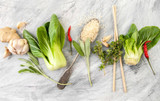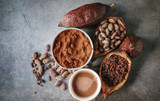
Edible, organic and natural seeds may be tiny, but they are nutritional powerhouses that compliment a balanced diet!
Although there are many varieties of edible seeds, all are excellent sources of Essential Fatty Acids (EFAs), plant-based protein and fibre. The protein and fibre help satisfy hunger and reduce appetite, whilst the healthy fats help to release the satiety (hunger) hormones that let you know when you are full. Seeds also contain a diverse profile of vitamins and minerals that can help to promote and maintain overall health.
Seeds are nutrient dense, which means a small amount goes a long way. They can easily be added into our everyday diet in a variety of ways including adding a handful into to muesli, porridge, smoothies and soups; enjoying them as a snack; sprinkling over salads or stir-fries; and creating seeded baked goods!
Take a look at our quick guide to seeds below and discover the nutritional benefits of each variety.
Goodness Tip: Keep your seeds in the fridge! As most seeds are naturally high in oils, they are susceptible to becoming rancid if not stored correctly. The best way to keep them fresh once opened is to store them in the fridge or freezer.
CHIA SEEDS
Chia seeds are loaded with nutrients and are commonly referred to as a superfood. Chia seeds are one of the richest natural plant sources of omega-3 fatty acids and are a great source of plant-based protein, antioxidants and fibre.
When soaked, chia seeds become gelatinous and can be used to thicken foods such as soups, sauces, jams, or as an egg replacement in baking. Un-soaked, they can be sprinkled on top of cereal, smoothie bowls and salads.
Nutritional content/100g
Total fat - 30.8g
Protein - 15.6g
Dietary Fibre - 37.7g
Omega 3 - 17552mg
Manganese - 2.2mg

HULLED HEMP SEEDS
Hulled hemp seeds, also known as "hemp hearts", have their outer shell removed, leaving you with the soft, chewy centre that is versatile and easy to use. Hemp seeds are made up of 33% protein, (which is higher than quinoa) and contain all 20 amino acids, including the nine essential amino acids that our bodies cannot produce on their own. This makes hemp a "complete" protein source. Hemp seeds are also high in essential fatty acids omega-3 and omega-6, which help with our immune system functions and are essential for fuelling our brains.
They can be added to smoothies, bliss balls, used as a salad or soup topper and can make delicious hemp milk!
Nutritional content/100g
Total fat - 45g
Protein - 36.7g
Magnesium - 640mg
Zinc - 11.5mg

LINSEEDS
Linseeds, also known as flax seeds, are a great source of omega-3, omega-6, plant-based protein, and minerals such as manganese, thiamine and magnesium. Linseeds are low in carbohydrates but extremely high in both soluble and insoluble fibre.
They are available in both a golden or brown colour. There are little to no differences nutritionally between the two varieties. To aid in digestion and absorption, Linseeds are best consumed after being soaked, ground or sprouted. Similar to chia seeds, soaked linseeds can be used as an egg substitute or thickener. Linseeds can also be used as an addition to muesli, smoothies, bliss balls and more.
Nutritional content/100g
Total fat - 42.2g
Protein - 18.3g
Dietary Fibre - 27.3g
Omega 3 - 22813mg
Omega 6 - 5911mg

PEPITAS
Pepitas (which is Spanish for “little seeds of squash") come from specific varieties of pumpkins that allow the seed to grow shell-free in the pumpkin – unlike the white the seeds you find in common pumpkin varieties.
They are high in protein, healthy fats, and fibre and contain valuable minerals such as magnesium, manganese, phosphorus, zinc and iron.
Pepitas can be eaten as a snack or added to salads for a little crunch. If lightly toasted they are delicious sprinkled over sautéed vegetables or used as a soup topper.
Nutritional content/100g
Protein - 24.5g
Phosporus - 1174mg
Manganese - 3mg
Iron - 15mg
Magnesium - 535mg

STYRIAN BLACK PUMPKIN SEEDS
Styrian pumpkin seeds come from a pumpkin, specifically grown for the seed, that originated in Styria, Austria. The Styrian pumpkin seeds are naturally shell-less and are larger in size, darker green in colour and richer in taste than other pumpkin seeds or pepitas. They are similar to pepitas nutritionally, with them being a great source of protein, healthy fats and essential vitamins and minerals.
Nutritional content/100g
Total Fat - 45.8g
Vitamin K - 51.4mcg
Copper - 1.4mg
Zinc - 7.5mg

SESAME SEEDS
Sesame seeds are an excellent source of copper, and a good source of manganese, magnesium, calcium, phosphorus, iron, zinc and selenium. Sesame seeds are available both hulled and unhulled. Hulled sesame seeds have had the outer husk removed and have are a creamy, white colour, whilst the black sesame seed variety is commonly unhulled. They have an only slight difference in taste however are often combined to add a striking contrast in dishes.
Nutritional content/100g
Copper - 4.1mg
Iron - 14.5mg
Magnesium - 351mg
Calcium - 975mg
Selenium - 5.7mcg

SUNFLOWER SEEDS
Sunflower seeds are an excellent source of Vitamin E, which is often used in skincare to promote skin health. They also contain a high percentage of selenium, which helps supports thyroid health and the immune system.
Similar to hemp seeds, the outer, black (and often striped) shell of the sunflower seed is inedible, however, the kernel or 'heart' is soft, creamy and versatile in use. Sunflower seeds can be used in baked goods, salads and stir-fries. They can also be made into a seed butter or meal.
Nutritional content/100g
Thiamin - 1.5mg
Manganese - 1.9mg
Vitamin E - 33.2mg
Copper - 1.8mg
Selenium - 53mcg

All nutritional information was provided by SELF Nutrition Data


![Introducing Yarra Valley Tea [Supplier Spotlight] Introducing Yarra Valley Tea [Supplier Spotlight]](https://cdn11.bigcommerce.com/s-dis4vxtxtc/images/stencil/160w/uploaded_images/blog-thumbnail-yarra-valley.jpg)
![Introducing Matcha Maiden [Supplier Spotlight] Introducing Matcha Maiden [Supplier Spotlight]](https://cdn11.bigcommerce.com/s-dis4vxtxtc/images/stencil/160w/uploaded_images/blog-thumb-matcha-maiden.jpg)

![Introducing Fangst [Supplier Spotlight] Introducing Fangst [Supplier Spotlight]](https://cdn11.bigcommerce.com/s-dis4vxtxtc/images/stencil/160w/uploaded_images/blog-thumbnail-fangst.jpg)